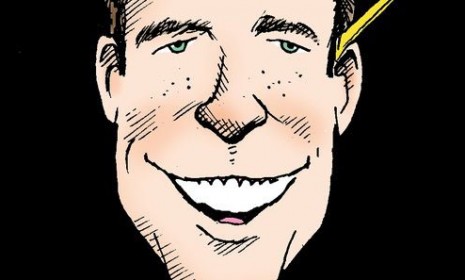Issue of the week: Why TV writers are celebrating
The writers saw the future of television and went on strike to win a piece of it, said Economist.com. And after 100 days on the picket line, they succeeded. Under a tentative agreement struck this week by the Writers Guild of America and television produc
A free daily email with the biggest news stories of the day – and the best features from TheWeek.com
You are now subscribed
Your newsletter sign-up was successful
The writers saw the future of television and went on strike to win a piece of it, said Economist.com. And after 100 days on the picket line, they succeeded. Under a tentative agreement struck this week by the Writers Guild of America and television producers, writers for the first time will earn a small cut of the revenue—2 percent or 3 percent—generated by programming streamed on the Internet. They also doubled their share of revenue from programming sold via downloads. “If the Internet is the future of video content, as many people believe, the agreement could greatly benefit Hollywood’s scribes.” But there are some catches. The payments for streaming start only after a show has been online for 17 to 24 days. The writers also dropped their demand for a larger cut of DVD sales, and they failed to extend the deal’s terms to cover writers for reality shows and animated series. “That is important: being able to fill holes with reality shows protected the media companies financially during the strike.”
Overall, the writers should feel pretty good about the outcome, said David Carr in The New York Times. Getting a piece of digital revenue was “a major concession from management” and represented “the kind of victory that has largely eluded organized labor in the past few years.” Of course, it could be years before programs on digital platforms such as PCs, iPods, and mobile phones throw off significant revenue. Meanwhile, the strike gave TV production studios an opening to change the system for developing new shows. Until the strike, studios paid writers “lucrative stipends to come up with shows that might not ever be broadcast.” Studio heads vow that going forward, they will commission far fewer such “pilot” episodes. And “what about viewers, the real victims of the strike, deprived of new episodes of Heroes?” It can’t have escaped the attention of either the producers or the writers that while the strike dragged on, for the most part “the public shrugged and worked on their Guitar Hero chops.”
Still, people are eager to learn when they’ll get to see new episodes of their favorite shows, said Sheila Marikar in ABCnews.com. Here’s the rundown: Late-night talk shows that hadn’t already struck deals with their writers will return immediately. Half-hour sitcoms such as The Office and How I Met Your Mother should be back on the air by April. The last to return will be animated shows such as Family Guy and hour-long dramatic series such as 24; both types of programs require long production lead times. News of the pending deal turned last week’s Writers Guild award ceremonies in New York into a celebration, said Matea Gold in LATimes.com. Triumph the Insult Comic Dog, “the profane dog puppet of Late Night With Conan O’Brien,” spoke for many when he said, without profanity: “I’m told the agreement was met with some controversy, but I believe the overwhelming majority of the guild is relieved to stop striking and get back to being out of work.”
The Week
Escape your echo chamber. Get the facts behind the news, plus analysis from multiple perspectives.

Sign up for The Week's Free Newsletters
From our morning news briefing to a weekly Good News Newsletter, get the best of The Week delivered directly to your inbox.
From our morning news briefing to a weekly Good News Newsletter, get the best of The Week delivered directly to your inbox.
A free daily email with the biggest news stories of the day – and the best features from TheWeek.com
-
 ‘Those rights don’t exist to protect criminals’
‘Those rights don’t exist to protect criminals’Instant Opinion Opinion, comment and editorials of the day
-
 Key Bangladesh election returns old guard to power
Key Bangladesh election returns old guard to powerSpeed Read The Bangladesh Nationalist Party claimed a decisive victory
-
 Judge blocks Hegseth from punishing Kelly over video
Judge blocks Hegseth from punishing Kelly over videoSpeed Read Defense Secretary Pete Hegseth pushed for the senator to be demoted over a video in which he reminds military officials they should refuse illegal orders
-
Issue of the week: Who killed the Twinkie?
feature The seemingly imperishable Twinkie has finally met its match, and its name is Big Labor.
-
Issue of the week: Apple’s patent victory over Samsung
feature Apple's “sweeping victory” is among the biggest intellectual-property triumphs on record.
-
Issue of the week: Goldman Sachs’s ‘toxic’ culture
feature Greg Smith’s stinging public resignation from Goldman Sachs landed on Wall Street “like a bomb.”
-
Issue of the week: Can a mortgage deal revive housing?
feature Five big banks reached a settlement with state and federal officials to pay $26 billion to offset some of the damage caused by their misdeeds in the foreclosure crisis.
-
Issue of the week: Europe gets downgraded
feature Standard & Poor's lowered the credit rating for nine European nations, indicating that Europe has not yet convincingly dealt with the debt crisis.
-
 Tom Toles: Cartoonist of the Year
Tom Toles: Cartoonist of the Yearfeature Meet the winner of The Week's Cartoonist of the Year award
-
 Cartoonist of the Year finalists
Cartoonist of the Year finalistsfeature A brief look at this year's nominees
-
Issue of the week: Calling out the crash’s culprits
feature The Senate's Permanent Subcommittee on Investigations has just published its 635-page report on the financial crisis.